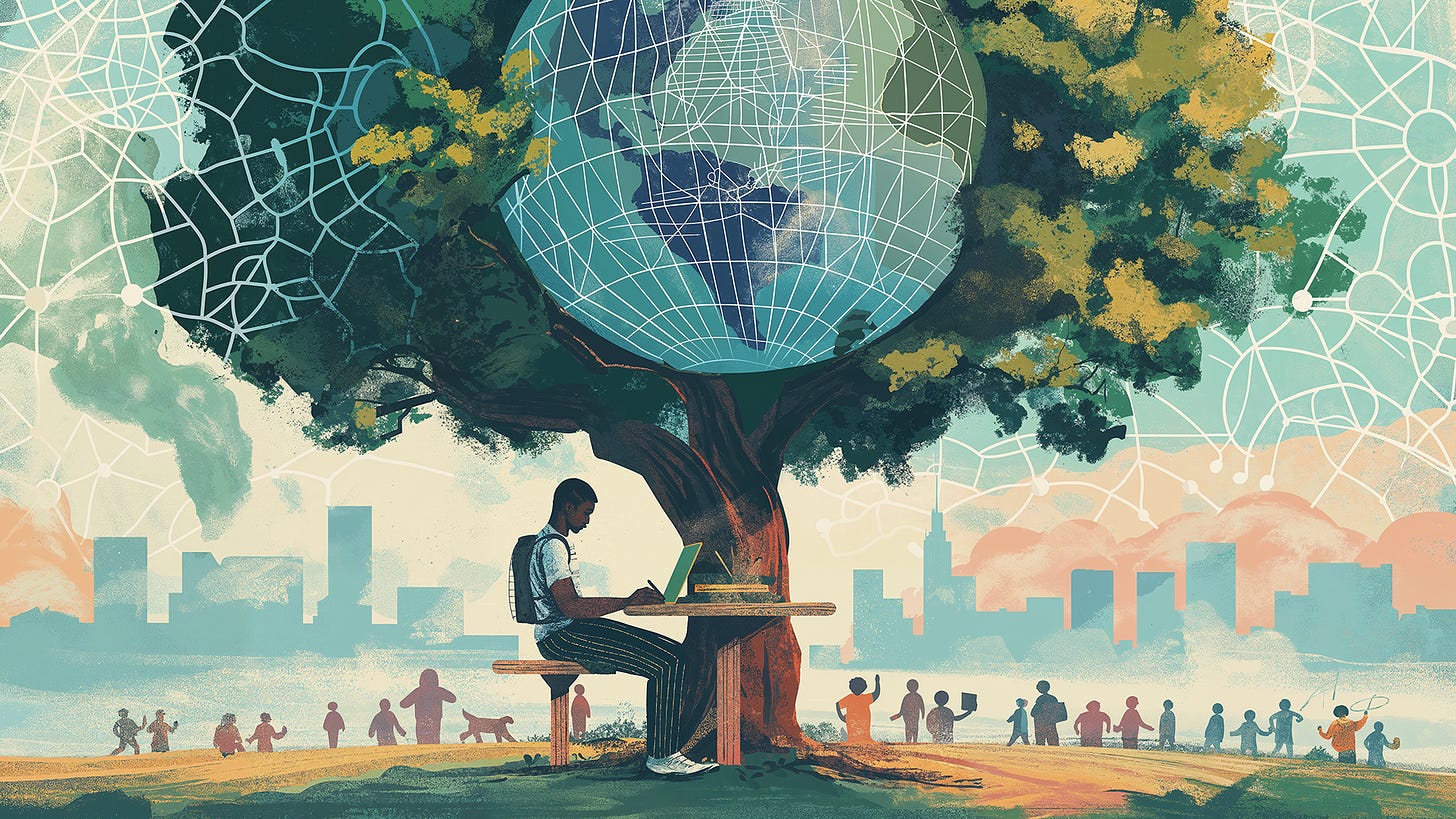Unintuitive Discourse: Writing for Humanist Activism and Transformative Change
How Political Humanism guides my mission to inspire activists and changemakers through purposeful writing and impactful messages.
Over the years, my understanding of complex political and ethical issues has evolved significantly. My journey has been shaped by a commitment to examining debates with nuance and intellectual rigor.
Initially holding "progressive" and "liberal" views, I have come to appreciate the importance of looking beyond ideological absolutism and simplistic reasoning. This transformation has been facilitated by the capabilities of artificial intelligence, which allows me to dive deeper into issues than would be possible for a single individual.
My work focuses on introducing a multi-dimensional, responsibly progressive, yet vigilant perspective to public discussions. I refer to this as Political Humanism. Political Humanism finds its roots in Humanism, a perspective that prioritizes human welfare and potential over divine or supernatural considerations. Humanism underscores the inherent worth and goodness of humans, focuses on shared human necessities, and adopts purely logical approaches to address human issues.
Political Humanism is not just a philosophical stance but a deliberate endeavour to usher humanistic values into the mainstream political arena. At its core, it prioritizes human well-being, rights, and potential, advocating for political systems and structures that are dedicated to these principles.
Political Humanism recognizes that all political discourse is a form of impactful social engineering, shaping the very fabric of our societies and propelling civilization forward. It encourages individuals to actively participate in this discourse, steering it with reason, empathy, and evidence-based policies. This proactive engagement seeks to shift the Overton window, pushing forward ideas that might currently be seen as unconventional or radical but which hold the promise of advancing the human experience universally.
Political Humanism provides a comprehensive framework for understanding the evolution of civilizations and societies. It emphasizes the role of humans as both architects and beneficiaries of societal progress, valuing our capacity for critical thinking, ethical considerations, and a commitment to global betterment.
It's essential to underscore that Political Humanism stands distinctly apart from other ideologies. It neither aligns with nor borrows from socialism, democratic socialism, communism, Marxism, or its many adaptations, including cultural Marxism, wokeism, and the broader narratives of Western leftism and progressivism. Instead, it offers a fresh perspective, uniting individuals from diverse backgrounds under the shared goal of enhancing the human experience for all through active, informed participation in the political process.
In today's polarized world, Political Humanism is more relevant than ever. It offers a way to navigate the complexities of modern society by promoting intellectual humility, critical thinking, and a commitment to ethical principles. By framing discussions through a humanist lens, we can strive for a just and inclusive society without losing sight of the risks and challenges that come with change. This approach not only enriches public discourse but also helps to cultivate a more thoughtful and compassionate world.
Beyond Simplistic Reasoning and Ideological Absolutism
In contemporary discourse, political and ethical debates often become absolutist and polarized, failing to grasp the intricate realities of our world. Such arguments overlook the complexities of real-world issues, reducing them to moral certainties or mere promises of societal improvement.
Nuanced analysis is required to understand these issues comprehensively. This involves recognizing potential risks and unintended consequences to shape future visions responsibly. Our visions must be guided by a deep understanding of these complexities, not just ideals.
A responsible approach necessitates critical examination of beliefs and propositions, going beyond surface-level intentions or perceived benefits. True progress requires grappling with uncomfortable truths and subjecting our own convictions to scrutiny.
Intellectual humility, understanding system complexity, and awareness of human frailty and fallibility are essential. No single perspective or ideology holds a monopoly on sound judgment or justice.
One notable pitfall of ideological fervor is its potential for catastrophic outcomes under the guise of benevolence. History is replete with examples where rigid adherence to utopian ideals has led to unintended harm. Marxism and communism, despite their professed concern for human welfare, often impose rigid ideological frameworks that disregard individual liberties and diversity of thought. Their language often mimics humanist values but is fundamentally coercive and anti-pluralistic.
A Balance of Optimism and Precaution
While advocating for ethical progress and envisioning a society imbued with values of liberty and inclusion, it is crucial to emphasize that achieving these goals must not justify any means. The pursuit of these ends must safeguard all fundamental values simultaneously, as each is essential to a just society. Incremental reforms and course corrections, rather than radical upheavals, better ensure that core values are not sacrificed in the name of idealism.
Consideration of impacts on marginalized communities and future generations is paramount. It's imperative to heed dissenting voices that uphold conscience and justice, preventing any single vision from becoming authoritarian. Constitutional checks and balances are crucial safeguards against the tyranny that can arise from unchecked progressivism.
In today's debates, balancing optimism for justice and inclusion with prudent skepticism towards unchecked power is crucial. Solutions must be ethical, sustainable, and cognizant of the complex interplay of competing interests and values. Rejecting simplistic dichotomies in favor of nuanced approaches fosters a society where a true diversity of perspectives can thrive, ensuring a more resilient and equitable future.
By adopting a humanist lens, we can critically examine and counter the encroachment of ideologies like Marxism and communism, which mimic humanist rhetoric while undermining pluralism and individual freedoms. Humanism stands as a robust ideological framework capable of resisting such encroachments, advocating for genuine pluralism, ethical progress, and the preservation of fundamental human liberties.
The Path from Idealism to Extremism
Unchecked idealism, without critical examination and tempered pragmatism, can inadvertently lead to extremes such as communism or fascism. Despite their contrasting outward forms, both ideologies fundamentally reject pluralism and display an intolerance for dissenting voices. They often arise from a well-intentioned desire to reshape society according to a singular vision, whether for economic equality or national unity.
The allure of these ideologies lies in their promise to swiftly rectify perceived injustices. However, history shows that such measures frequently lead to unintended consequences, eroding freedoms and genuine diversity in the name of achieving ideological purity. This erosion is often most evident through the suppression of free speech and the imposition of censorship, justified by appeals to kindness, compassion, and the greater good.
Free speech is foundational to civilization-building, fostering an environment where ideas can compete and the best can prevail. Censorship, even when motivated by the desire to eliminate harmful or offensive speech, undermines this foundation. It creates an unequal market of ideas, where dissenting voices are silenced rather than debated. The answer to bad speech is not censorship but better speech—more reasoned, more compelling arguments that can withstand scrutiny in a truly open discourse.
Historically, both communism and fascism have sacrificed free speech at the altar of ideological purity. In communism, this often manifests as state-controlled media and the suppression of dissent to maintain the appearance of collective progress. In fascism, rigid conformity to a narrow set of social norms stifles innovation and diversity, with dissenters marginalized or persecuted.
Humanism stands firmly against censorship and promotes the idea that the best way to counter harmful speech is through more speech, fostering an environment where ideas can be freely expressed and rigorously debated. By adopting a humanist lens, we can effectively challenge the rhetoric of communism and fascism, which often co-opts humanist language while undermining genuine pluralism and individual liberties. Humanism provides a robust framework to critique and resist the encroachment of extremist ideologies, rooted in respect for individual rights and diversity of thought.
The Value of an Independent, Principled, and Unafraid Voice
In a world where uniformity and agreement are often the norm, it is more essential than ever to remain committed to independent thought and principled discussion. As an author, commentator, and activist, my mission is to provide a forum for voices that dare to challenge prevailing orthodoxy and interrogate deeply ingrained assumptions.
I aim to challenge the prevailing complacency in today's society—an unsettling blend of self-satisfaction and ignorance of real dangers and shortcomings. My goal is to illuminate contradictions, expose the contradictions, and promote critical thinking, cultivating an environment of open-minded inquiry and vigorous debate. Rather than shying away from uncomfortable truths or inconvenient facts, I embrace them as catalysts for personal and collective enlightenment and progress.
In a society where cultural Marxism often masquerades as intellectual progress and where political correctness can stifle honest discourse, I believe it is essential to maintain a steadfast commitment to free speech and intellectual honesty. This means being willing to say the unsayable, question the unchallengeable, and engage in difficult conversations that might otherwise be suppressed or avoided. Furthermore, it is crucial to call out the self-righteous 'woke' individuals, liberal lefty progressives, and their condescending 'I'm better than you' attitude, which often undermines genuine progress and fosters a culture of intolerance.
In an era of rampant groupthink and echo chambers, my role is to serve as a gadfly, provoking reflection, challenging assumptions, and pushing boundaries. I do not seek to validate or confirm preconceived notions; rather, I strive to illuminate new perspectives, challenge prevailing narratives, and stimulate a deeper understanding of the complexities that underpin our world.
Ultimately, my goal is to contribute to a more informed, enlightened, and compassionate society by fostering a culture of open-minded inquiry, robust debate, and principled dissent. I believe that by encouraging critical thinking, promoting intellectual honesty, and challenging prevailing orthodoxies, we can create a world that is more just, equitable, and humane for all.
Who I Write For
Unintuitive Discourse is tailored for a diverse and intellectually curious audience.
Here's a closer look at the people I write for:
Human and Civil Rights Activists
These individuals advocate for social, political, and economic changes to promote and protect the rights of marginalized communities. They are driven by a passion for justice and equality.
Potential Use: Identify root causes of social injustices, refine advocacy strategies, and foresee unintended consequences of policy decisions.
Grassroots Activists and Organizers
At the community level, they mobilize groups around shared issues, playing a crucial role in building community power and promoting social change.
Potential Use: Understand community dynamics, build effective coalitions, and craft impactful campaigns.
Community Organizers
Focus on creating effective coalitions within neighborhoods, faith groups, unions, and other community settings to address local issues.
Potential Use: Develop strategies for effective community organizing and address power imbalances within communities.
Social Justice Advocates
Strive to promote equal rights and opportunities for all, combating discrimination and systemic oppression.
Potential Use: Analyze root causes of social inequality, develop strategies for equal opportunities, and advocate for systemic change.
Local Governance Officials and Policymakers
Shape policies at the local level that impact various aspects of society, driving meaningful change through informed decision-making.
Potential Use: Analyze policy impacts, anticipate outcomes, and design effective policies to address complex societal challenges.
Social Entrepreneurs & Change-Makers
Innovators who start businesses with a dual purpose: generating revenue and creating positive social, cultural, or environmental impact.
Potential Use: Identify opportunities for social impact, innovate new approaches to social challenges, and integrate ethical considerations into business models.
Scholars and Students of Political Science
Study the theory and practice of politics, government, international relations, and human rights.
Potential Use: Analyze political phenomena, assess theories, propose solutions, and prepare future leaders with critical thinking skills.
Educators and Trainers
Facilitate learning and development, shaping the minds and skills of future generations.
Potential Use: Integrate mental models into curriculum design, foster critical thinking, and prepare students to navigate complex social and political landscapes.
Policymakers and Civil Service Workers
Responsible for creating and implementing policies that affect society at large.
Potential Use: Analyze policy impacts, foresee unintended consequences, and develop effective strategies to address societal challenges.
Politicians
Hold or seek elected office, requiring effective communication and understanding of complex policy issues.
Potential Use: Navigate political landscapes, build alliances, communicate policies effectively, and drive legislative change.
Why I Write
The core mission of Unintuitive Discourse is to promote effective leadership, critical thinking, and decision-making within the realms of humanist activism and social change. This platform aims to provide a comprehensive framework grounded in humanist values, scientific inquiry, and Bitcoin philosophy. By leveraging these principles, I seek to inspire readers to challenge their assumptions, engage deeply with complex issues, and actively shape a better future.
The Goals of My Literature
For each audience profile, my literature aims to offer insights and guidance on key aspects of activism and social change, deeply embedding humanist thought into the analysis of complex issues. My goal is to create a body of work that explores the intricacies of the world exclusively through a humanist lens. This approach ensures that the principles of humanism—empathy, reason, and ethical progress—are integral to the ideas and strategies presented. Here are the key aspects I focus on:
Navigating Complex Political and Social Landscapes: Equipping readers with the tools to understand and maneuver through intricate political and social environments.
Analyzing and Addressing Root Causes: Providing methodologies to identify and tackle the foundational issues underlying social and political problems.
Developing Critical Thinking and Problem-Solving Skills: Encouraging the cultivation of analytical skills necessary for effective decision-making and innovative problem-solving.
Building Effective Coalitions and Advocacy Strategies: Sharing strategies for forming strong alliances and designing impactful advocacy campaigns.
Promoting Fairness, Justice and Human Rights: Upholding the principles of fairness, equality and justice, advocating for the protection and advancement of human rights.
Creating Sustainable and Impactful Social Enterprises: Guiding the development of social enterprises that are not only sustainable but also create significant positive impacts.
Applying Scientific Reasoning and Humanist Values: Utilizing empirical evidence and humanist principles to address real-world issues and promote rational, ethical solutions.
By embedding humanist thought into every facet of my literature, I aim to foster a deeper understanding of the world that prioritizes ethical considerations, rational inquiry, and the well-being of all individuals. This comprehensive approach encourages readers to think critically about the challenges we face and to seek solutions that are both just and sustainable.
My Commitment
As the founder and sole writer of Unintuitive Discourse, I draw upon my extensive background in politics, media, public relations, activism, and a lifelong journey of self-education. This diverse experience shapes my unique perspective, allowing me to approach political and cultural discourse through scientific, humanist, and evolutionary lenses. My commitment is to empower activists, policymakers, educators, and scholars to drive meaningful change, fostering a community of critical thinkers and advocates.
In my writing, I strive to:
Promote Critical Thinking: Encourage readers to question their assumptions and engage in rigorous analysis of issues.
Advocate for Humanist Values: Emphasize the importance of compassion, empathy, and ethical behavior in all aspects of activism and social change.
Leverage Scientific Inquiry: Utilize scientific methods and evidence-based reasoning to inform discussions and propose solutions.
Incorporate Bitcoin Philosophy: Explore the transformative potential of Bitcoin and its alignment with humanist values, advocating for financial autonomy and systemic change.
Utilize AI to Augment Abilities: Leverage the capabilities of artificial intelligence to dive deeper into complex issues, uncover hidden patterns, and enhance the depth and breadth of research and analysis, thereby augmenting my abilities to provide comprehensive insights.
Join me in this journey. Let's engage in thoughtful conversations, challenge conventional thinking, and drive positive social transformation together. By combining optimism for a just and inclusive future with a realistic understanding of the complexities and risks involved, we can work towards a world that upholds the dignity and rights of all individuals.








